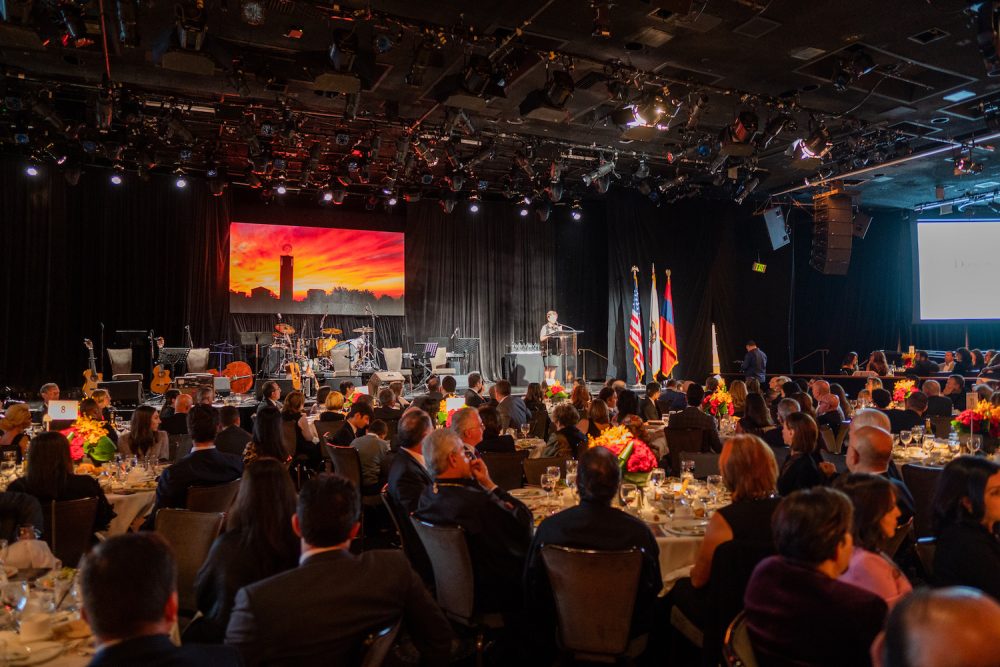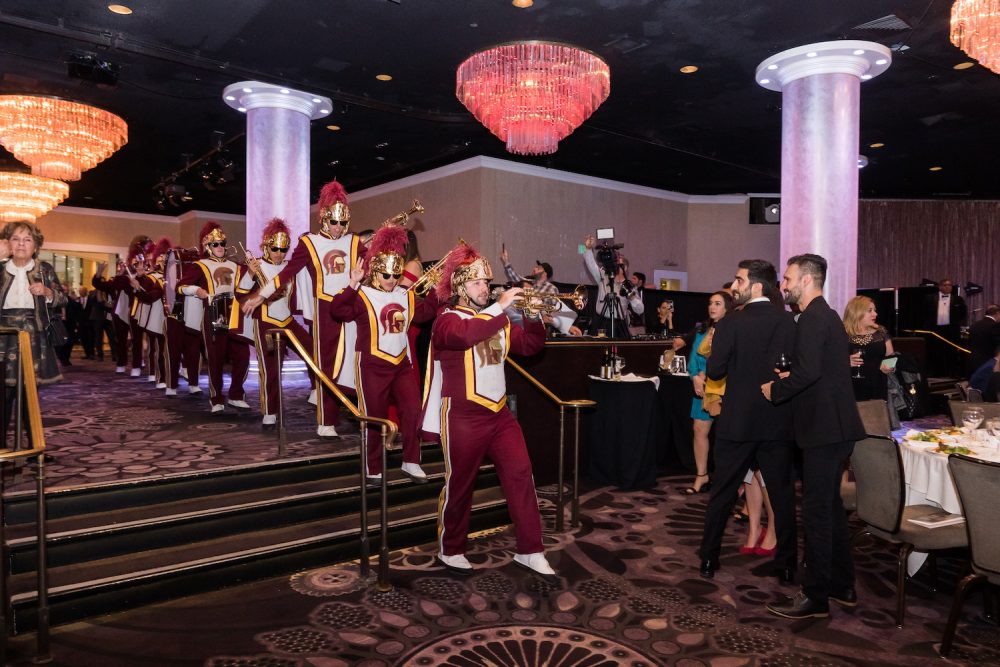“The USC Institute of Armenian Studies has been doing outstanding work for 15 years,” said Amber D. Miller, Dean of USC Dornsife College of Letters, Arts and Sciences. “This work is central to one of our key research themes, ‘Identity and Culture in a Changing World.’”
Dean Miller spoke to the 600-plus guests gathered at the Beverly Hilton Hotel on Sunday, September 29. The gala was hosted by the Institute’s Leadership Council to celebrate 15 years of championing education, innovation, and thoughtful change.
The evening highlighted the Institute’s work and presented a vision for 21st century scholarship and innovation – a commitment to producing and supporting research on post-genocide issues, on the global Armenian Diaspora, and on the Republic of Armenia. Over the last five years, the Institute has broken new ground by strategically funding research in areas that are crucial to Armenia’s development, and creating massive, world-class platforms where research and intellectual conversation can take place, among qualified specialists and with an eager and curious audience.
Since its inception, the Institute has benefited from the continuous support of the community.
Many of those supporters were honored during the Gala.
The Institute recognized the support of families who have funded endowments that support research and programming: Cabayan Family Foundation, Karapetian Family Foundation, Vartkes and Lucine Kassabian Family Endowment, Kazanjian Foundation Endowment Fund, Keyan Scholarship Fund, Kofdarali Endowment Fund, Melkonian Family Scholarship Fund, Nadjarian Endowment Fund, Nayasargian Endowment Fund, and Tufenkian Memorial Endowed Scholarship Fund. This year, the Baghdassarian Family Foundation and Bayramyan Family Endowment Fund were added to the list of donors.
Following the USC marching band’s performance, the evening’s unique polished program began with a warm welcome by Gala Banquet Committee co-Chairs, Lori Muncherian and Diane Cabraloff. Charles Ghailian, chairman of the Institute’s Leadership Council, one of the founders of the Institute, and together with his family a generous supporter of the Institute, also welcomed and acknowledged the decade-and-a-half long support of the Institute by members of the community, and most importantly, from the institutions that are important to Armenian life in the Diaspora.
Director Salpi Ghazarian spoke on the intrinsic place this unique Institute can have in the lives and work of each organization and institution in Armenian life. “The Institute is about making connections — a meaningful connection to the past, a collaborative connection among innovators, strategic connections between Armenia’s policymakers and the research that is essential to policy. The active and substantial support of the community will make it possible for the Institute to continue and expand this essential work.”
The Institute’s Academic Council, Professor Daniel Mazmanian, formerly dean of the Price School of Policy, Professor Donald Miller, formerly head of the School of Religion, and Professor Manuel Pastor, the Turpanjian Chair in Civil Society and Social Change, and director of the USC Center for the Study of Immigrant Integration took the stage. They recognized Mr. and Mrs. Gerald and Patricia Turpanjian, benefactors of the Institute, for their early and sustained championing of the Institute as testimony of unwavering faith in nation and education. The Turpanjians have established two chairs that bear their family’s name: the Turpanjian Early Career Chair in Contemporary Armenian Studies and the Turpanjian Chair in Civil Society and Social Change.
The evening’s program revolved around the Institute’s groundbreaking program and those who make that programming possible. Reddit co-founder Alexis Ohanian shared a message to recognize the Innovation Generation, as represented by Nina Achadjian, principal at Index Ventures and founder of HIVE ventures, and Ara Mahdessian and Vahe Kuzoyan, co-founders of Service Titan, a software company with an estimated value of over $1.5 billion, and recently recognized by Forbes as one of the top 15 cloud-based solutions in the world.
Next, former US Ambassador to Armenia John Marshall Evans, a member of the Institute’s National Council, reinforced the value of the Institute’s DISPLACED PERSONS PROJECT. A number of the three dozen DPs who have been interviewed by the Institute were recognized for entrusting their stories, documents, and memories to the Institute, for further use by researchers.
Another Institute program that reaches beyond the university into the public square is the Institute’s MEDIA CENTER, made possible with the support of Varant and Hoori Melkonian. To recognize this generous and visionary gift, Apo Boghigian, the new director of the Civilitas Foundation and CivilNet, shared a message on the significance and impact of media (traditional and social) in the world, and especially for the Armenian world.
The USC POLICY FELLOWS program, an Institute collaboration with the government of Armenia and the City of Los Angeles was introduced by Councilmember Paul Krekorian whose office makes the program possible. The Institute recognized the JHM Foundation for their support of this program as an expression of their belief in the importance of strategy and planning for Armenia. Accepting the recognition on their behalf were the two current Policy Fellows Armine Chakhalyan from Armenia and Haik Mayilyan from Karabakh.
Finally, the newest of the Institute’s programs was introduced — THE USC TACORI CENTER — a multipurpose location, just 20 minutes from Yerevan that will become an important regional conference and retreat center. This is affirmation of the Institute’s commitment to advancing scholarship about and in Armenia. Armenia’s Ambassador to the United States, His Excellency Varuzhan Nersesyan, sent a message thanking the Tacorian Family for their vision and commitment.
The program included selections from SOUND STORIES — a unique collaboration between the Element Band and the Institute, first performed at INNOVATE ARMENIA.
Established in 2005, the USC Institute of Armenian Studies supports multidisciplinary scholarship to re-define, explore and study the complex issues that make up the contemporary Armenian experience – from post-Genocide to the developing Republic of Armenia to the evolving Diaspora. The Institute encourages research, publications and public service, and promotes links among the global academic and Armenian communities.















